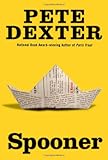 Advance readers copies, the paperbacks sent out early to book reviewers, often contain special notes from authors or editors that impart a little back story or extol the virtues of the book at hand, but I’ve never seen an author’s note quite like the one that Pete Dexter penned for the advance readers copies of his forthcoming novel Spooner:
Advance readers copies, the paperbacks sent out early to book reviewers, often contain special notes from authors or editors that impart a little back story or extol the virtues of the book at hand, but I’ve never seen an author’s note quite like the one that Pete Dexter penned for the advance readers copies of his forthcoming novel Spooner:
As far as I know, sometime in November of last year, the book you have in your hands was three years late. There are many reasons it was three years late, probably the most conspicuous being that it was once 250 pages or so longer than the version you hold, and it takes maybe half a year to write an extra 250 pages, and at least twice that to subtract them back out. I realize this leaves another year and a half unaccounted for, and all I can say about that, readers, is get in line. Whole decades are missing from my life and I am pretty sure I wouldn’t have it any other way.
At any rate; it turns out that bringing a book home three years past deadline presents problems for the publisher. Publications have to be set (again), covers drawn, generous comments collected – god knows how many of my greatest admirers have died while I’ve been diddling around with this thing – and so you can understand, perhaps, that in the end someone had to put his/her foot down and say enough, and in the end somebody did. Be assured it wasn’t me. I could have kept this up for another five years. Oh, and a title. They thought a title might be nice.
All to say that what you have here, while not exactly a first draft, is further away from the finished product than most advanced readers’ editions are, and when you come across sentences you particularly don’t like, keep in mind that I probably didn’t like them either. On the odd chance that the bad sentences are still there when the book comes out, then you should keep in mind that you’re reading somebody who is still missing 18 months of the last 36, and has no idea about 2006 at all.
This isn’t the first time that Dexter has prefaced a book with an introduction that threatens to divide his readers into those who get his sense of humor and those who don’t. The introduction to Paper Trails (this time in the actual published edition), which collects Dexter’s columns and articles from his legendary newspaper career, lets us know that he had little interest in collecting his columns in the first place. He tells us that the 82 columns and articles we are about to read will lack dates and any indication as to where they first appeared because, basically, he and his editor Rob Fleder didn’t want to dig them up. He also calls the venerable Washington Post book critic Jonathan Yardley a “worn-out old whore.”
What’s interesting to me about Dexter is that, while his fiction is quite good, his wry, impolitic sense of humor doesn’t always shine through in his noirish, almost hard-boiled novels. Instead, you need to read his (essential) Paper Trails or keep an eye out for things like the remarkable author’s note quoted above.








